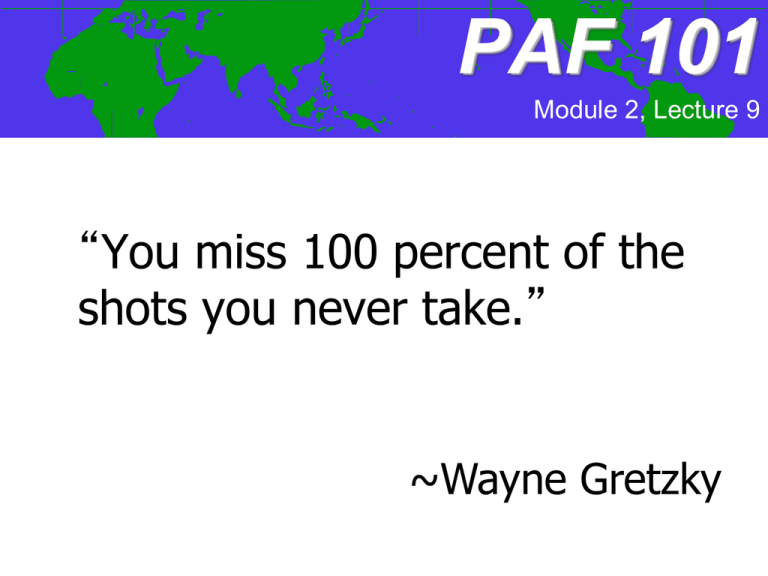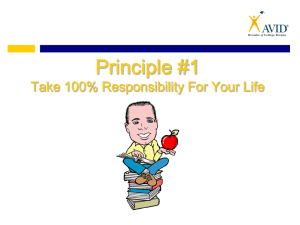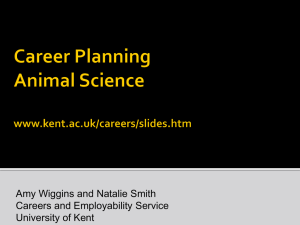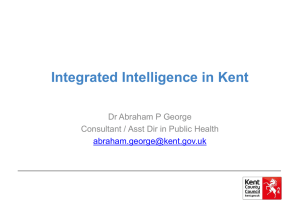
PAF 101
Module 2, Lecture 9
“You miss 100 percent of the
shots you never take.”
~Wayne Gretzky
Class Agenda
Announcements
Competition Debriefing
Attendance Policy Reminder
Assignment for Next Class
Competition Points
Winner is group 8! They receive 5
points.
All other groups receive 3 points…
Except groups 1 and 9. They receive 0
points because they are losers.
Competition Points
Winners
Losers
As of 2/13/2015
Group #
Points
4
13
2
10
12
10
15
10
17
10
1
9
8
9
18
9
6
8
13
8
14
8
10
7
11
7
16
7
3
6
7
6
5
4
9
4
Alumni Quote
“When I was a TA for PAF 101, students complained about
how anal we and you were about spelling, grammar, font and
all those fun formatting rules that everyone loses points for on
those modules. And I remember students saying it wasn’t
relevant to the real world and that only in ‘academia’ did
such BS exist. Well, thank God for such anal retentiveness,
because these government contracts and guidelines are so
specific it would blow the PAF requirements to shame!
Attention to detail is the first rule for getting your foot in
the door of the real world!”
~Laurie Schrall, Senior Consultant at consulting firm,
BearingPoint
BAD THINGS HAPPEN WHEN YOU
DON’T PAY ATTENTION TO DETAIL
HEY, SEXY. WANNA ENROLL?
Admissions forms that Seton Hall University mailed
to tens of thousands of prospective students
abroad contained a misprinted telephone number
that instead connected callers to a phone-sex line,
the Newark, N.J., Star-Ledger reported. A
recording instructed callers to dial another number
to talk to "hot, horny girls" for 99 cents to $2.99 a
minute (Chronicle of Higher Education, 2/15/06).
Module 2 Debriefing
Topic:
The Chancellor of Syracuse University,
Kent Syverud, asked for the design of a
survey to assess what undergraduates
think of his leadership on campus.
Exercise 4.1 A
(Kent Syverud)
Gathering Information for and Determining the
Purpose of a Survey
Quote the definition of the term “target population” from
the Maxwell Manual.
Place definition here: “The target population is the group of
individuals who answer the survey.”
Exercise 4.1 A
(Kent Syverud)
Gathering Information for and Determining the
Purpose of a Survey
Quote the definition of the term “target population” from
the Maxwell Manual.
Place definition here: “The target population is the group of
individuals who answer the survey.”
Problem 1: The definition
given is for sample not target
population.
Problem 2: The quote is
missing an internal citation.
(Coplin, 2007, p.38)
Exercise 4.1 B
(Kent Syverud)
Gathering Information for and Determining the
Purpose of a Survey
Name the Player, their organization and title here:
Chancellor Kent Syverud, Syracuse University, Chancellor
Briefly describe the purpose of the survey you will be
designing here: Asking students about the Chancellor.
Identify the target population you will sample for your
survey. Write a specific description of your target
population including its geographic location and approximate
size: Students attending class on campus.
Exercise 4.1 B
(Kent Syverud)
Gathering Information for and Determining the
Purpose of a Survey
Name the Player, their organization and title here:
Chancellor Kent Syverud, Syracuse University, Chancellor
Briefly describe the purpose of the survey you will be
designing here: Asking students about the Chancellor.
Identify the target population you will sample for your
survey. Write a specific description of your target
population including its geographic location and approximate
size: Students attending class on campus.
Problem 1: Do not
include ‘Chancellor’
twice.
Problem 2: Description of
Problem 3: Not a
survey is poor. Should talk abut SPECIFIC description,
the students’ view on the
too vague.
Chancellor’s leadership in
undergraduate education.
Exercise 4.1B (Cont.) (Kent Syverud)
Gathering Information for and Determining
the Purpose of a Survey
• Write a piece of factual information that could be
gathered through your survey here: The percentage of
students who are satisfied and unsatisfied with the
current undergraduate education system.
• Write a piece of attitudinal information that could be
gathered through your survey here: Whether or not
students think the Chancellor is a good leader.
• Describe specific policies the player might develop from
the information gathered in your survey here:
Chancellor Syverud will have more open office hours
and will provide raises for faculty.
Exercise 4.1B (Cont.) (Kent Syverud)
Gathering Information for and Determining
the Purpose of a Survey
• Write a piece of factual information that could be
gathered through your survey here: The percentage of
students who are satisfied and unsatisfied with the
current undergraduate education system.
• Write a piece of attitudinal information that could be
gathered through your survey here: Whether or not
students think the Chancellor is a good leader.
• Describe specific policies the player might develop from
the information gathered in your survey here:
Chancellor Syverud will have more open office hours
and will provide raises for faculty.
Problem 1: The actual information
is actually attitudinal. Also, doesn’t
directly relate to the Chancellor’s
leadership.
Problem 2: The second policy
is not relevant to the topic.
Exercise 4.2 A
(Kent Syverud)
Choosing a Sample and Method of Contact
Indicate and discuss which of the three methods of contact
from the Maxwell Manual you will use to contact your
sample.
• State the method using terms in the Maxwell Manual
here: E-mail and call people
• Justify why you have chosen to use this method using
information from the Maxwell Manual here: This way,
we can try and reach every single person either with
phone or email.
Exercise 4.2 A
(Kent Syverud)
Choosing a Sample and Method of Contact
Indicate and discuss which of the three methods of contact
from the Maxwell Manual you will use to contact your
sample.
• State the method using terms in the Maxwell Manual
here: E-mail and call people
• Justify why you have chosen to use this method using
information from the Maxwell Manual here: This way,
we can try and reach every single person either with
phone or email.
Problem 2: Weak justification. Should
Problem 1: Should be only
one method of contact. Also,
“call people” should say
“telephone”.
include a rationale like: This method has a
high response rate according to the
Maxwell Manual. This range should be
satisfactory because the response rate for
telephone is 40-75% (Coplin, 2007, p.49).
Exercise 4.2 B
(Kent Syverud)
Choosing a Sample and Method of
Contact
Identify one variable you will use to assess the
degree to which your sample accurately reflects
your target population. Identify the variable here:
Attitudes toward the Chancellor.
Explain why the variable you chose matters, and
why it is important that the distribution of your
particular variable should be similar to the target
population:
The way people will answer the survey will be
determined by their views toward the chancellor.
Exercise 4.2 B
(Kent Syverud)
Choosing a Sample and Method of
Contact
Identify one variable you will use to assess the
degree to which your sample accurately reflects
your target population. Identify the variable here:
Attitudes toward the Chancellor.
Explain why the variable you chose matters, and
why it is important that the distribution of your
particular variable should be similar to the target
population: Correct: “the variable class year is
important because the amount of time students
have spent at SU may affect their feelings about
Kent Syverud.”
Problem 1: Not an appropriate
variable. Should choose gender, age,
class year, race, or other traceable
characteristic.
Problem 2: Old answer
doesn’t answer question.
Exercise 4.3 A
(Kent Syverud)
How Would You Get the Sample
Clearly and concisely describe the exact procedures you
will use to select the sample and contact the
respondents. Be detailed and list each step needed to
select the sample. Be realistic.
• List the steps you will follow here:
1. Call students in a random order.
2. Ask them the questions.
3. Record the answers.
Exercise 4.3 A
(Kent Syverud)
How Would You Get the Sample
Clearly and concisely describe the exact procedures you
will use to select the sample and contact the
respondents. Be detailed and list each step needed to
select the sample. Be realistic.
• List the steps you will follow here:
1. Call students in a random order.
2. Ask them the questions. Problem: Steps are incomplete.
•Where do they get the names?
3. Record the answers.
Need a list.
•Need to describe what “random”
means.
•Need to say how many students
they will call until complete.
Exercise 4.3 B
(Kent Syverud)
Determining Sample Size
Complete the following steps to determine your sample
size and confidence interval.
• Restate your target population (from 4.1B) and its size here:
SU undergrads, 12,000 students
• Indicate the size of the sample you plan to analyze here: 2000
• Indicate the approximate percentage this represents of the
target population here: 30%
• Indicate the 95% confidence interval of responses from a
sample of this size here: 5%
Exercise 4.3 B
(Kent Syverud)
Determining Sample Size
Complete the following steps to determine your sample
size and confidence interval.
• Restate your target population (from 4.1B) and its size here:
SU undergrads, 12,000 students
• Indicate the size of the sample you plan to analyze here: 2000
• Indicate the approximate percentage this represents of the
target population here: 30%
• Indicate the 95% confidence interval of responses from a
sample of this size here: 5%
Problem 1: Target population
still not specific enough. Full
time or part time students?
Which campus? Main, south,
abroad? Also missing
geographic location.
Problem 2: Percent is
incorrect.
2,000/12,000 x 100 = 17%
Problem 3:
Confidence interval
is incorrect and
missing + or –
should be ± 2.5%
Exercise 4.3 C
Determining Sample Size
Complete the following steps to determine your response rate and
required number of contacts.
• Estimate the exact response rate you expect for your survey here:
1750 people
• Justify the rate you chose here: “According to the Maxwell Manual,
phone calls will get a 40% - 75% response rate” (Coplin, 2007, p.49).
• Write down how many people you will have to contact in order to
obtain your desired number of responses here: 2000
• Using the formula from the text, show the calculations that you used
to find how many people you will have to contact here:
Desired sample = # of contacts
Expected response rate
2000 = 1750
1.15
Exercise 4.3 C
Determining Sample Size
Problem 1: Response rate should be a
percent, not a raw number.
Complete the following steps to determine your response rate and
required number of contacts.
• Estimate the exact response rate you expect for your survey here:
1750 people
• Justify the rate you chose here: “According to the Maxwell Manual,
phone calls will get a 40% - 75% response rate” (Coplin, 2007, p.49).
• Write down how many people you will have to contact in order to
obtain your desired number of responses here: 2000
• Using the formula from the text, show the calculations that you used to
find how many people you will have to contact here:
Desired sample = # of contacts
Expected response rate
Problem 2: Not an adequate justification;
must state why that rate was chosen and
need to pick ONE rate, not a range.
2000 = 1750
1.15
Problems 3&4: Incorrect understanding of
response rate messed up the calculations;
whole sections are incorrect.
Exercise 4.4
Creating the Questions
(Kent Syverud)
Provide examples of two closed-choice questions for
your survey. All response categories must be shown.
Follow the format in the Maxwell Manual.
• Write the question that will gather factual
information here:
Do you think Kent Syverud’s blog posts and emails
are effective? Yes No Don’t Know/Not Sure
• Write the question that will gather attitudinal
information here:
Do you believe Kent Syverud is an approachable
person outside of academics? Yes No
Exercise 4.4
Creating the Questions
(Kent Syverud)
Provide examples of two closed-choice questions for
your survey. All response categories must be shown.
Follow the format in the Maxwell Manual.
• Write the question that will gather factual
information here:
Do you think Kent Syverud’s blog posts and emails
are effective? Yes No Don’t Know/Not Sure
• Write the question that will gather attitudinal
information here:
Do you believe Kent Syverud is an approachable
person outside of academics? Yes No
Problem 1: This question is
attitudinal because it asks for an
opinion.
Problem 2: Should also say
Not Sure/Don’t Know
Helpful Hints:
Know the difference between factual and attitudinal
Closed questions should include all choices, including
“Don’t know” or “N/A”
Don’t overestimate response rate, must justify with
Maxwell Manual
Descriptions must be specific (mention specific type
of policy)
Variables: Freshman and Sophomore are not the
name of the variable: Class year is.
Confidence interval: should have + or –
Class Homework Reminder
If absent, you are still responsible for
homework. Check the previous lecture
slides online.
If you miss class Monday, and
homework is due Wednesday, you must
bring it in Wednesday or you will
receive a five point penalty.
For Next Class
Try to complete Exercise 4 over the
weekend.
Module Two is Due By 12:45 p.m. on
Friday, February 20






